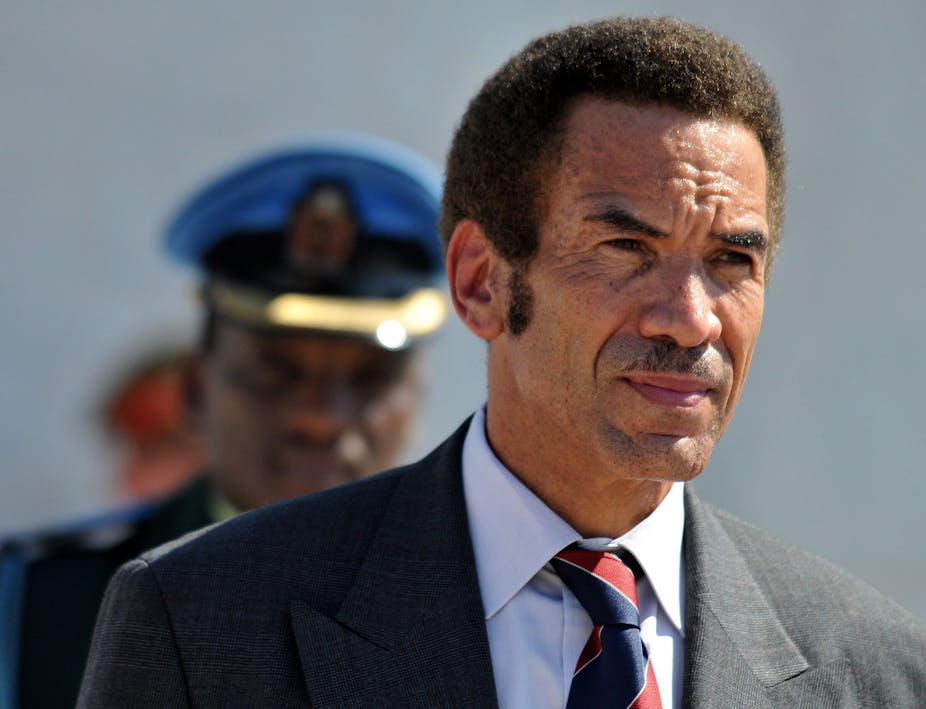September 2016 marked 50 years since Botswana attained independence from British rule. Over the decades, the small landlocked country has been regarded as a role model for success in Africa. It has achieved political stability, democratic government, and remarkable economic growth.
The attraction of Botswana and its history is newly reinforced in the film ‘A United Kingdom.’ The story begins more than 15 years before independence when the territory was known as the Bechuanaland Protectorate. The plot follows the marriage of Seretse Khama, a royal African prince, to Ruth Williams, a white British woman.
The apartheid regime was outraged and exerted political pressure on the British, who held important mining interests in South Africa. To ease tensions, the British forced Seretse into exile in England from 1950 to 1956. He was only allowed to return to Botswana after abdicating his claim to the chiefdom.
Seretse would later enter party politics in the early 1960s, leading the then Bechuanaland Democratic Party to victory in 1965 and independence the following year.
For a global audience, the movie provides a topical account of race relations. The love story is also likely to revitalize the popular perception of Botswana as a national success story.
The 50-year anniversary was a time for Botswana to celebrate. But now is the time to reflect on the historical context for this imagery and question whether it has relevance for modern-day Botswana.
The building of a tiny country
Geopolitically and economically Botswana was one of the weakest countries to ever gain freedom from colonial rule. Its landlocked position was ominous. It bordered white minority regimes in South Africa, South-West Africa (Namibia) and Rhodesia (Zimbabwe). South Africa, occupying the main trading route, could readily intimidate Botswana with crippling sanctions and violent incursions.
Diplomacy was difficult. Relations with the apartheid regime in South Africa required a tightrope walk between economic cooperation and political distance. Botswana’s post-colonial leadership was slow to build wider credibility within the Organisation of African Unity. Overly reliant on British aid, the country was in desperate need of economic partners and diplomatic connections further abroad.
External onlookers doubted Botswana’s viability and its capacity to resist South African pressure. In defiance, Seretse upheld a vision of security and prosperity in a non-racial democracy.
He insisted all individuals were entitled to political freedoms and individual protections, without racial discrimination. These values appeared ambitious to uphold in a young developing state. But they soon proved to be a vital asset.
Regarded as noble and sincere, Seretse thrived in multilateral forums and bilateral meetings. His country had qualities that appeared exceptional and therefore worthy of assistance. There was even a convincing proposal that Botswana could encourage a wider transformation throughout Southern Africa.
Seretse’s winning strategy
Seretse’s argument was simple. Apartheid relied on the notion that multi-racialism could not work in southern Africa. To challenge this, peacefully, Botswana needed to present a thriving alternative.
The more aid Botswana received, the more of a success it could become. And the more it could be seen as a success, the more it would undermine the ideology of apartheid. This was not purely a form of wishful idealism. Instead, it proved to be a practical response for a country that upheld the integrity of its principles.
The approach had its greatest appeal in the U.S. It inspired diplomats, politicians, scholars and anti-apartheid activists. In the following decade, Botswana became one of the highest recipients of U.S. foreign aid per capita.
Effective leadership and policymaking were also crucial. This was best demonstrated in Botswana’s effective management of a rich mining boom in diamonds.
Despite Botswana’s apparent achievements, the territory’s external security could not be guaranteed for many decades. Botswana accepted refugees provided they did not use its territory as a base to advance liberation struggles. But without an army until 1977, it was powerless to stop deadly incursions by South African and Rhodesian security forces chasing suspected freedom fighters.
Yet Botswana’s great appeal, especially in North America and Western Europe, proved to be its own form of defense. Botswana could rely on almost universal diplomatic protests toward any act of provocation.
The nation would outlive the neighboring powers that once posed a threat to its existence.
Seretse, who died in 1980, ultimately proved that multi-racialism was possible in the region.
Botswana today
With these white minority regimes now long gone, Botswana has lost its claim to exceptionalism. Today, there are valid reasons to question Botswana’s “success.” The Botswana Democratic Party has remained in power since independence. President Ian Khama, Seretse’s son, shows increasing signs of authoritarianism.
Homosexuality is illegal and the San, an indigenous hunter-gatherer population, face appalling levels of discrimination.
Growth is slowing in an economy that has failed to diversify away from diamonds. More worrying, Botswana’s supply is expected to run out within the next two decades.
As the nation reached 50, the historical context of Botswana’s “success” reveals it to be an outstanding example of image-building in circumstances where survival was tied to international visibility.
Botswana may be reasonably depicted as a “United Kingdom” that triumphed because of its inspiring message of interracial unity. Nonetheless, the portrait of success is outdated. It is unlikely to be revived for future anniversaries without substantial improvements in economic progress, human rights and social justice.

